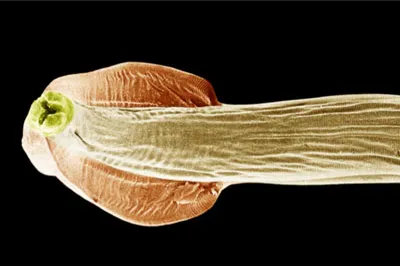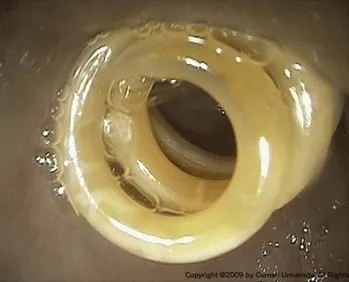Roundworms are among the most prevalent internal parasites found in dogs, affecting nearly all canines at some point in their lives, particularly as puppies. These tenacious parasites are easily spread and challenging to control due to their various modes of transmission. A significant concern for dog owners is not only the health of their beloved pets but also the potential for these parasites to impact human health. The question, “Can Worms In Dog Poop Affect Humans,” is a crucial one, and the answer underscores the importance of proper pet care and hygiene practices to protect both animals and people from these common invaders.
What Are Roundworms and How Do Dogs Get Them?
Roundworms, primarily Toxocara canis, are spaghetti-like parasites that live in a dog’s intestines. They are exceptionally common, and their lifecycle allows for easy transmission. Dogs can become infected in several ways:
- Maternal Transmission: This is the most frequent route for puppies. Mother dogs can pass roundworm larvae to their offspring while they are still in the womb or through their milk after birth. This is why almost all puppies are born with or acquire roundworms very early in life.
- Environmental Ingestion: Dogs, especially puppies, can ingest microscopic roundworm eggs containing larvae from contaminated environments. These eggs are incredibly resilient and can survive in soil for years.
- Eating Infected Prey: If a dog consumes small mammals like mice, rabbits, or birds that have roundworm larvae encysted in their tissues, the dog can become infected. This acts as a paratenic host, bridging the lifecycle.
Once ingested, these larvae embark on a journey through the dog’s body, including the liver and lungs, before returning to the intestines to mature into adult worms, where they lay thousands of eggs daily, perpetuating the cycle through the dog’s feces.
 Close-up image of a Toxocara Canis roundworm, a common intestinal parasite found in dogs.
Close-up image of a Toxocara Canis roundworm, a common intestinal parasite found in dogs.
Recognizing Roundworm Symptoms in Your Canine Companion
While many adult dogs might not show overt signs of a roundworm infection, especially if the infestation is mild, puppies and dogs with heavy worm burdens often exhibit noticeable symptoms. Adult roundworms reside in the dog’s intestines, absorbing nutrients meant for their host.
Key indicators of a roundworm infection in dogs include:
- Gastrointestinal Distress: Diarrhea and vomiting are common. In severe cases, dogs may vomit up live worms, which appear white or light brown and can be several inches long, resembling spaghetti.
- Physical Appearance: Puppies, in particular, may develop a “pot-bellied” appearance, have a dull coat, and fail to gain weight or grow properly despite eating.
- Coughing: If roundworm larvae migrate through the lungs during their lifecycle, they can irritate the respiratory system, leading to a cough.
- Visible Worms: You might observe adult roundworms directly in your dog’s feces or vomit. Their presence is a clear sign of infection.
Regular veterinary check-ups and fecal examinations are crucial for early detection, even if your dog shows no symptoms.
Effective Strategies for Preventing Roundworms in Dogs
Preventing roundworm infections is a multi-faceted effort that combines strict hygiene with regular veterinary care. Given the numerous ways dogs can contract roundworms, diligence is key to minimizing risk for both pets and their human companions.
Here are essential prevention strategies:
- Maintain a Clean Environment: Regularly clean and disinfect your dog’s living areas. Crucially, promptly remove and dispose of dog feces. Roundworm eggs become infectious after a few days in the environment, so quick removal prevents their spread.
- Limit Predatory Behavior: If possible, prevent your dog from hunting and consuming wild animals like mice or other small mammals that may carry roundworm larvae.
- Strategic Deworming for Puppies and Mothers: Puppies are highly susceptible and should follow a specific deworming schedule. Typically, they are treated at 2, 4, 6, and 8 weeks of age. Nursing mothers should also be kept on a monthly preventive and treated concurrently with their puppies to reduce the risk of transmission.
- Routine Fecal Examinations for Adults: Adult dogs should undergo fecal (stool) examinations 2 to 4 times during their first year of life and at least once or twice annually thereafter, even if they are on a preventive.
- Utilize Combination Preventives: Many heartworm preventives available today also offer protection against common intestinal parasites, including roundworms. Discuss appropriate prevention and treatment choices with your veterinarian to find the best option for your dog’s specific needs and lifestyle. This can significantly reduce
[if your dog has worms can humans get them](https://dogcarestory.com/if-your-dog-has-worms-can-humans-get-them/).
Implementing these measures is vital not just for your dog’s health but also for safeguarding human well-being.
 Diagram showing ascarid roundworms, also known as Toxocara canis, within a dog's intestine, illustrating their parasitic presence.
Diagram showing ascarid roundworms, also known as Toxocara canis, within a dog's intestine, illustrating their parasitic presence.
The Critical Question: Can Worms in Dog Poop Affect Humans?
The most pressing concern for many pet owners is the potential for zoonotic transmission—the spread of diseases from animals to humans. When it comes to roundworms, the answer to “can worms in dog poop affect humans” is a definitive yes, posing a significant public health risk, particularly to children.
Human infection typically occurs when individuals accidentally ingest microscopic roundworm eggs. These eggs are present in the feces of infected dogs and can accumulate in substantial numbers in soil where pets defecate. Children playing in contaminated environments, or adults gardening without gloves, can easily pick up these eggs on their hands and inadvertently transfer them to their mouths.
Once ingested by a human, the roundworm eggs hatch, and the larvae migrate through various tissues and organs, a condition known as larva migrans. This migration can lead to serious health issues:
- Visceral Larva Migrans (VLM): Larvae travel to internal organs like the liver, lungs, heart, or brain. Symptoms can be non-specific, including fever, cough, abdominal pain, or an enlarged liver. Severe cases, especially if larvae reach the brain, can cause neurological damage.
- Ocular Larva Migrans (OLM): In some cases, larvae migrate to the eye, causing inflammation and potentially vision loss, often in one eye. This condition can be misdiagnosed as other eye diseases.
Protecting humans from roundworm infection requires stringent hygiene practices:
- Promote Hand Washing: Emphasize thorough hand washing with soap and water, especially after playing outdoors, gardening, or handling pets.
- Supervise Children’s Play: Children should not be allowed to play in areas where animals have defecated. Sandboxes should be covered when not in use to prevent contamination by stray animals.
- Practice Good Pet Waste Management: Always pick up dog feces immediately and dispose of it properly in sealed bags. This is the single most effective way to prevent environmental contamination.
- Wear Gloves: Individuals who have direct contact with soil that may have been contaminated by pet feces should wear gloves, particularly when gardening or working in play areas.
Understanding [the risk of human infection from dog worms](https://dogcarestory.com/if-your-dog-has-worms-can-humans-get-them/) is crucial for responsible pet ownership and community health.
Conclusion
Roundworms are a common reality for dog owners, but understanding their transmission, symptoms in dogs, and the potential impact on human health empowers us to take proactive steps. From diligent deworming schedules for puppies and regular veterinary check-ups for adults to consistent hygiene practices around pet waste, every measure contributes to a safer environment for both our beloved canine companions and ourselves. Protecting against these parasites is a shared responsibility that ensures the well-being of the entire family. Always consult your veterinarian for the most appropriate prevention and treatment plans tailored to your dog’s individual needs.
References
For veterinary professionals, more detailed information on roundworms can be found at https://www.capcvet.org/guidelines/ascarid/.
